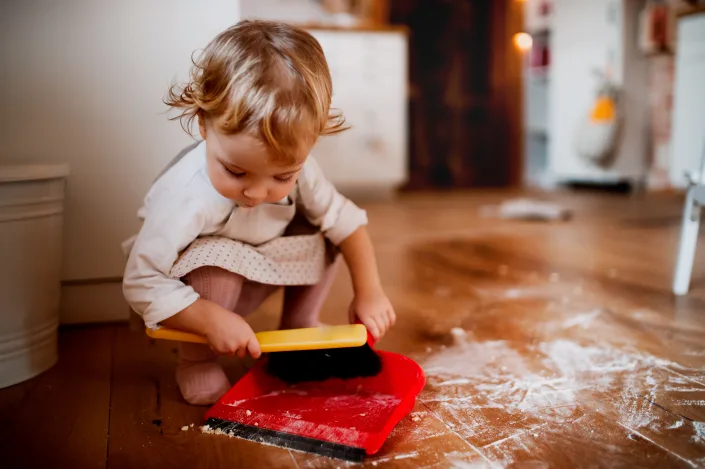
It’s often shocking to parents how much more cleaning is often required once children are added to the mix. From cleaning up spilled cereal to organizing a playroom full of toys, managing the daily chores that come with parenthood can be overwhelming.
But how old should your children be before you start asking them to contribute to the workload? Is it okay for young children to do chores? How can parents motivate their young children to help clean the house?
Britnee Tanner is a professional home organizer in Salt Lake City, Utah. Tanner’s children are 3 and 5 years old, so she’s also familiar with the struggle of keeping the house clean under the children’s feet.
How to teach children to clean
“One of the best ways to help kids learn to clean is to show them how to clean,” Tanner says. “Parents can’t expect their kids to just master the act of cleaning up-they really need to be shown and taught.”
For Tanner, that means taking the time to show and remind her children how and when to assist with chores such as cleaning their rooms, tidying the bathroom or wiping down the kitchen table.
However, Tanner cautions that just because the kids are helping doesn’t mean that perfect cleaning should be expected right away.
“It’s not about whether or not the house is actually completely tidy,” she explains. “It’s about teaching them how to do it so they get into the habit over time.”
When should you teach your child to help clean up?
According to Devon Kuntzman, founder of Transforming Toddlerhood in Cleveland, Ohio, helping your child develop these important habits and life skills should start early.
“The toddler years are a sensitive time to get your child involved in chores,” Kuntzman tells Yahoo Lifestyle. “[Toddlers] are often happy to help because they are driven growing up to want to feel empowered and play a role in the family without any reward.”
In the long run, this developmental stage can create intrinsic motivation for children around household tasks, according to Kuntzman. “When kids are still learning, we tend to put them aside so we can get the work done more effectively,” she says, “but kids can start helping with daily chores at about 18 months or once they get their feet under them. Start slowly, adding one task a week.”
As children grow, redefining chores as “family tasks” may be a positive shift felt by both children and parents. “Chores often have a negative connotation because many of us felt forced to do them as children, and it wasn’t fun,” Kuntzman says. “Family tasks are about working together as a team to help the family function. One of the great benefits of this is that children learn life skills so they can become more independent as they grow up.”
Should you “pay” your kids to do their chores?
Paul Sullivan, a former New York Times columnist and founder of The Company of Dads, has three daughters ranging in age from 4 to 12 years old. The Fairfield County, Connecticut, father says that when it comes to chores, it’s important to recognize how you can reward your children for their accomplishments.
“Absolutely appreciate them helping you out,” Sullivan said. “But paying them or bribing them for basic chores? No way.”
Sullivan believes these types of rewards can make it difficult for children to understand the meaning of their responsibilities as they grow up. “Did any of us ever get paid by our spouses to take out the trash, do the laundry or go to the grocery store on Sundays when all we wanted to do was relax? Nope.”
Nonetheless, Sullivan shares that every once in a while, and there is room for exceptions. “When it goes beyond that, that’s different,” he says. “My oldest daughter is very organized and likes to make money: we sometimes pay her to clean the game room when it gets out of hand.”
Kuntzman says rewards should depend on your family values and what you want to communicate around chores and housework. “Rewards are an extrinsic motivator,” she explains. “I prefer a celebration that the whole family can attend, such as a dance, movie night or fun weekend outing, over a monetary or food reward.”
“This creates a culture of teamwork and celebration for achieving goals,” she adds. “These tasks then become life skills rather than transactional tasks.”
An age-specific guide to assigning children’s chores
Elizabeth Fraley is an educator in Los Angeles, California, and CEO of Kinder Ready, an educational program focused on preparing children ages 3-12 for kindergarten and private school readiness. Fraley shares her list of chores for children of all ages.
1-2 years old
Put the toys in the toy box
3-4 years old
All of the above, plus.
Feeding pets
Setting the table
Making the bed
Putting clothes in the basket
5-6 years old
All of the above, plus.
Load the dishwasher (with adult help)
Set the table
Clear the table
Washing dishes (with adult supervision)
Wipe down countertops with wet paper towels
Match washed socks
Watering houseplants
7-8 years old
All of the above, plus.
Packing lunches for school
Load and unload the dishwasher
Helping to cook meals
Fold and put away laundry
Sweeping the floor
Rake leaves
9-10 years old
All of the above, plus.
Vacuuming
Washing clothes
Clean mirror
Dusting furniture
Clean porch, deck, garage or sidewalk
11-12 years old
All of the above, plus.
Washing dishes
Cleaning bathrooms
Cleaning the kitchen
Helping to prepare meals
Washing the car
Randy McCoy, Oregon philosopher. child development expert and vice president of programming at The Little Gym, shares that when trying to teach children the tasks and responsibilities behind cleaning, sometimes it’s best to keep it simple.
“Sometimes parents can expect too much, too soon,” he said. “When children can’t live up to their unrealistic expectations, it can lead to negative and hurtful feedback. As they learn to do their chores, as they learn to take pride in their work, as they learn what that means, be patient while they do a beautiful job.”



